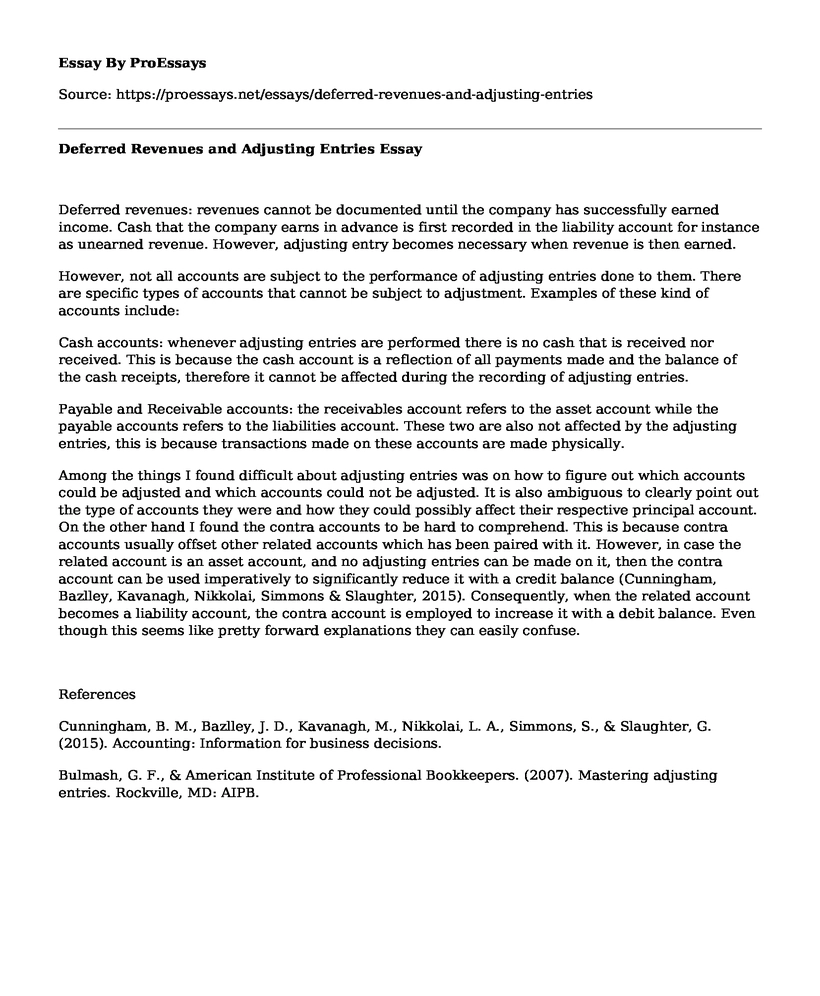Deferred revenues: revenues cannot be documented until the company has successfully earned income. Cash that the company earns in advance is first recorded in the liability account for instance as unearned revenue. However, adjusting entry becomes necessary when revenue is then earned.
However, not all accounts are subject to the performance of adjusting entries done to them. There are specific types of accounts that cannot be subject to adjustment. Examples of these kind of accounts include:
Cash accounts: whenever adjusting entries are performed there is no cash that is received nor received. This is because the cash account is a reflection of all payments made and the balance of the cash receipts, therefore it cannot be affected during the recording of adjusting entries.
Payable and Receivable accounts: the receivables account refers to the asset account while the payable accounts refers to the liabilities account. These two are also not affected by the adjusting entries, this is because transactions made on these accounts are made physically.
Among the things I found difficult about adjusting entries was on how to figure out which accounts could be adjusted and which accounts could not be adjusted. It is also ambiguous to clearly point out the type of accounts they were and how they could possibly affect their respective principal account. On the other hand I found the contra accounts to be hard to comprehend. This is because contra accounts usually offset other related accounts which has been paired with it. However, in case the related account is an asset account, and no adjusting entries can be made on it, then the contra account can be used imperatively to significantly reduce it with a credit balance (Cunningham, Bazlley, Kavanagh, Nikkolai, Simmons & Slaughter, 2015). Consequently, when the related account becomes a liability account, the contra account is employed to increase it with a debit balance. Even though this seems like pretty forward explanations they can easily confuse.
References
Cunningham, B. M., Bazlley, J. D., Kavanagh, M., Nikkolai, L. A., Simmons, S., & Slaughter, G. (2015). Accounting: Information for business decisions.
Bulmash, G. F., & American Institute of Professional Bookkeepers. (2007). Mastering adjusting entries. Rockville, MD: AIPB.
Cite this page
Deferred Revenues and Adjusting Entries. (2021, Mar 09). Retrieved from https://proessays.net/essays/deferred-revenues-and-adjusting-entries
If you are the original author of this essay and no longer wish to have it published on the ProEssays website, please click below to request its removal:
- Planning of an Official Visit Essay
- Accor Hotels Research Proposal Paper Example
- Analysis of an Entrepreneur: Naomi Simson
- Leadership Challenges in Entrepreneurship Essay Example
- Evaluation Essay on MacDonald's Restaurant
- Essay Example on Breach Avoidance: It Can Be Done, It Must Be Done
- Report Sample on Understanding Accounting: Roles, Functions, and Key Concepts







